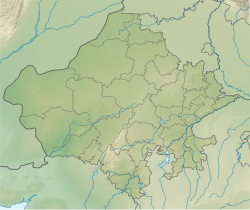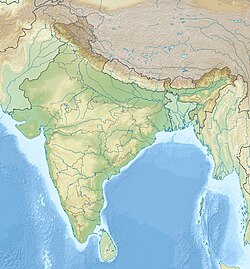| Mansi Wakal Dam | |
|---|---|
 | |
| Country | India |
| Location | Jhadol tehsil, Rajasthan |
| Coordinates | 24°28′35″N73°29′17″E / 24.476518°N 73.487928°E |
| Construction began | 2000 [1] |
| Opening date | 2005 [2] |
| Construction cost | ₹ 60 crore (US$7.1 million) [3] |
| Dam and spillways | |
| Impounds | Mansi River |
| Reservoir | |
| Active capacity | 24,400,000 m3 (19,781 acre⋅ft) [4] |
Mansi Wakal is a dam on the Mansi River in Udaipur district, Rajasthan, India.
Located approximately 7 kilometres north of the village of Jhadol, [5] the dam forms a reservoir which can hold about 24.4 million cubic metres of water. [4] The reservoir primarily provides drinking water to the city of Udaipur, [6] accounting for 23% of the city's drinking water supply. [7] Additionally, the reservoir supplies drinking water to rural areas of Udaipur district [3] and water for industrial uses to Hindustan Zinc. [8]
Mansi Wakal dam is part of an inter-basin transfer scheme called 'Mansi Wakal I' under which water is transferred from the Sabarmati basin to the Bherach basin. [2] The dam was constructed between 2000 [1] -2005 [2] by the Government of Rajasthan at a cost of ₹ 60 crore (US$7.1 million) [3] with monetary contributions from Hindustan Zinc in the ratio of 70:30. [8] Some local groups opposed the construction of the dam mainly over displacement concerns. [9] [10]

